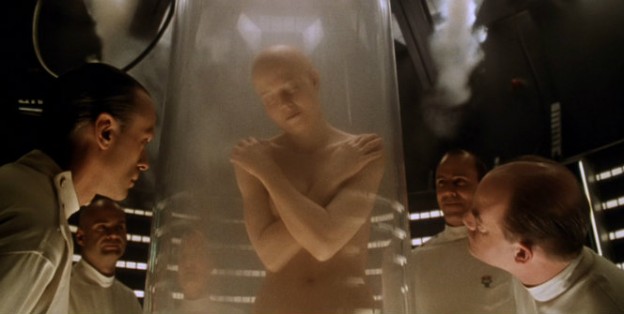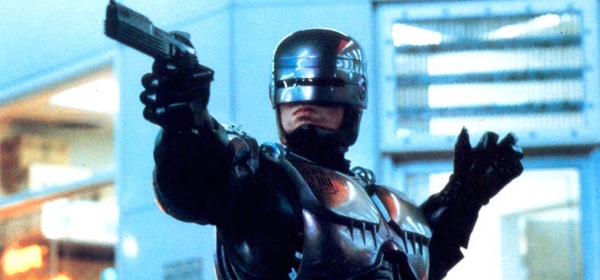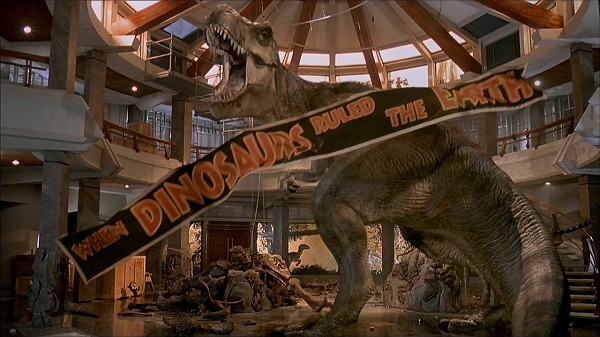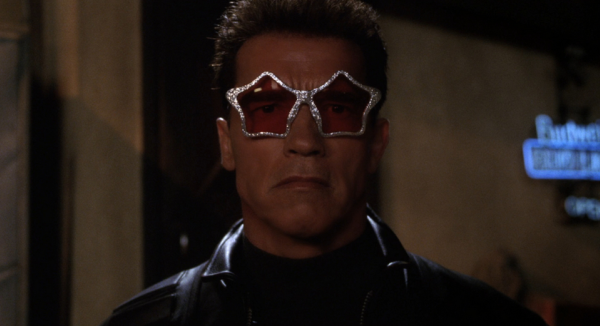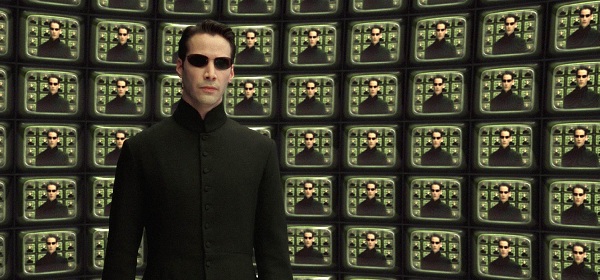This weekend’s release of The Hunger Games: Catching Fire has predictably set the box office ablaze. Based on author Suzanne Collin’s phenomenally successful young adult trilogy, the sequel sees Oscar winner Jennifer Lawrence return as badass heroine Katniss Everdeen and director Francis Lawrence (Constantine, I Am Legend) taking over behind the camera for Gary Ross (Seabiscuit, Pleasantville).
While the first film earned nearly $700 million worldwide, it was not without its critics, leading some to believe that The Hunger Games film franchise would fail to keep the momentum going and deliver on the promise of Collins’ novels. However, it appears that Catching Fire has managed to avoid the unfortunate fate that befalls many science fiction franchises and has successfully built upon the foundation of its predecessor. Over the years, many sci-fi franchises have struggled to sustain their freshness and creativity over the course of several films. To that end, here are five sci-fi film franchises that couldn’t help but disappoint.
5) Robocop
Films in the Series: 3
High Point? Paul Verhoeven’s 1987 original Robocop served as a sharp satire of capitalism, emerging technology and the media, introducing audiences to police officer Alex Murphy (Peter Weller) who – after a brutal attack – only survives as the half-man/half-machine known as Robocop. The film’s over-the-top violence, memorable supporting cast and influential production design have helped the film stand the test of time, as has the increasingly vital role technology has played in society since its release. Sure, the film feels very much like it came out in the 1980s, but the ideas it presents has never been more relevant. Robin Thicke notwithstanding, the real blurred lines nowadays involve the shockingly vague distinction between man and machine. Few films have more memorably handled this theme.
Low Point? By the time Robocop 3 hit theaters in 1993, Weller had jumped ship, leaving Robert John Burke to unremarkably take his place in the title role. The series’ extreme violence was also absent, thereby toning down one of its signature characteristic to earn a PG-13 rating, and its script – shamefully crafted by comic book legend Frank Miller – pits Robocop against silly robotic ninjas called Otomo and devolves what was once a compelling concept into a ridiculous display of sci-fi at its worst. There’s a reason Robocop 3 only has a Rotten Tomatoes score of 3%.
Hope of Redemption? Twenty years have passed since everyone’s favorite police cyborg has stormed into theaters, and anticipation is high for next year’s reboot/remake, which will star Joel Kinnaman as Murphy. It features an updated design of the title role and a cast that includes Samuel L. Jackson, Gary Oldman and Michael Keaton. The new film is reportedly aiming for a PG-13 rating but looks to include some of the political commentary that made the original film such a revelation. Longtime fans have had a mixed reaction, though it’s too soon to determine whether or not Robocop can reclaim his legacy.
4) Jurassic Park
Films in the Series: 3
High Point? In the last 20 years, only a handful of films can be labelled cinematic landmarks. Steven Spielberg’s 1993 sci-fi adventure about a dinosaur-centric theme park gone awry is certainly one of them. From John Williams’ iconic score to the ground-breaking visual effects, Jurassic Park is that rare movie that manages to somehow get better with each viewing. It captures both the majesty and terror inherent in its prehistoric headliners and features some of the most suspenseful sequences in film history (we still get chills whenever we spot a trembling glass of water). Add in unforgettable turns by Jeff Goldblum, Laura Dern, Sam Neill and Sir Richard Attenborough, and you have damn near the perfect Hollywood thrill ride on your hands.
Low Point? The Lost World: Jurassic Park may not have aged nearly as well as the preceding film in the series, but it’s the 2001 release of Jurassic Park III that truly put the nail in the franchise’s coffin. The film sees Neill return to lead the film as Dr. Alan Grant, who is unwittingly lured back to the Isla Nublar by an estranged couple desperate to find their missing son. Sadly, the cliché drama between this broken family eats up much of the film’s focus, ultimately leading to a predictable climax. Moreover, the T-Rex and Velociraptor antagonists that served as the main attractions in the first two films are swept to the side, replaced by the far-less-interesting Spinosaurus and the underused Pterodactyls. Certainly, this switch was designed to keep the series fresh, but instead the filmmakers should have placed more of an emphasis on a compelling narrative and the suspenseful tone that worked so well in Spielberg’s films.
Hope of Redemption? For over a decade, the Jurassic Park series has tried in vain to pull itself back together (further evidence of the damage done by the underwhelming third film). However, the project has recently gained some traction, with director Colin Trevorrow (Safety Not Guaranteed) and actress Bryce Dallas Howard (The Village) onboard. Entitled Jurassic World, the film’s plot – and its connection or lack thereof to the original trilogy – remains unknown.
3) The Terminator
Films in the Series: 4
High Point? Long before he helmed the two most financially successful films of all time, James Cameron broke onto the big screen with a little 1984 sci-fi adventure called The Terminator. That film – produced for just $6 million – made Arnold Schwarzenegger an action hero and led to the cinematic milestone of Terminator 2: Judgment Day. That 1991 sequel pioneered the then-burgeoning concept of computer generated imagery with the shape-shifting T-1000 (as played by Robert Patrick) and is still regarded as one of the best action films ever made. Linda Hamilton’s portrayal of Sarah Connor, iconic mother of the future leader of the human resistance, and the unique way the film builds upon her character arc from the first film only help to T2‘s place in sci-fi history
Low Point? By the time the series got to its fourth installment – Terminator Salvation – it had strayed so far from the gravitas and innovation of its early days that the fact that Schwarzenegger does not appear (save for a sad-looking CGI double) is the least of its problems. The film stars Christian Bale as the grown-up John Connor, but both Bale and co-star Sam Worthington deliver performances so false and lifeless that viewers will inevitably wonder if these two are also cybernetic organisms. After spending three films building up to Judgment Day, the franchise finally gets to deal with the aftermath of the machines’ terrifying rise – only briefly glimpsed in the films – and the result is the most boring, convoluted and ultimately pointless entry of the Terminator series.
Hope of Redemption? Now that Schwarzenegger has returned to the world of film, the prospect of Terminator 5 has powered back to life, albeit slowly. Thor: The Dark World‘s Alan Taylor is currently attached to direct the film, which sounds like it will continue to center around John Connor and is set for release in 2015. This new film is reportedly intended to kick off a standalone trilogy of films. The Terminator mythology is certainly rich enough to allow for a whole new set of stories, but Taylor and his crew will have to take great care in how they approach the project to truly return the franchise to greatness.
2) Alien
Films in the Series: 4 (6 if you count the Alien vs. Predator films)
High Point? Ask the average movie geek which is better – Ridley Scott’s 1979 “slasher film in space” thriller Alien or James Cameron’s (yes, him again) 1986 “war film in space” action/adventure Aliens – and you’re likely to get an extremely jumbled, convoluted and non-committal answer. The truth is that both films have their merits and have earned their rightful places among the most beloved sci-fi films of all time. Sigourney Weaver’s Ellen Ripley is arguably the best female action hero ever to grace the screen, and the Oscar-winning visuals, production design and atmospheric tone of both films are flawless…
Low Point? …which is precisely by Alien 3 was such a disappointment. In keeping with its predecessors’ shift from one sub-genre to another, the third film plays like a “prison movie in space” and sees a more jaded, cynical Ripley tangle (once again) with the acid-spewing extra-terrestrial. The film is remarkably uneven but does feature a poignant conclusion to the Alien trilogy, a turn of events totally undermined by the unnecessary, gratuitous and unfathomably dreadful Alien: Resurrection. That 1997 film is proof positive that sometime, when it comes to Hollywood, too much of a good thing is a bad thing.
Hope of Redemption? After Resurrection, Fox turned its attention to a pair of poorly-received mash-up films featuring the Alien creatures facing off against those from the Predator series. Last year though, Scott took it upon himself to rejigger the franchise he started with prequel/reboot Prometheus, and while that film features the visual style and strong female protagonist of the 1979 release, it didn’t quite live up to expectations. Scott and stars Noomi Rapace and Michael Fassbender have promised that a sequel will happen eventually. So time will tell if the Alien franchise can truly redeem itself. For now, it has managed to pulled itself out of the muck and began the long, arduous process of cleaning itself up.
1) The Matrix
Films in the Series: 3
High Point? Like most of the other films on this list, The Matrix is heralded by many to be one of the gold standards of science fiction. The anime-style tale of Thomas Anderson a.k.a. Neo (Keanu Reeves) is brimming with intriguing philosophical themes, breathtaking visuals (Bullet-Time, anyone?) and unforgettable characters like Laurence Fishburne’s Morpheus and Hugo Weaving’s devious Agent Smith. The 1999 film simultaneously pays tribute to its influences and went on to inspire a ton of imitators of its own, which parodied or outright stole from the film’s distinctive wire-work. Yet, while its action sequences, cast and appropriately synthesized Don Davis score brought audiences to The Matrix, the ideas presented by the Wachowskis’ tightly crafted script kept them coming back for more.
Low Point? Fans of the original film were understandably thrilled then when they heard that the Wachowskis were reuniting with the cast to produce two sequels. Filmed back-to-back, The Matrix Reloaded and The Matrix Revolutions were both released in theaters in 2003, but while Reeves, Fishburne, Carrie-Anne Moss and Weaving reprised their roles, the twin sequels brought in over a dozen new, underdeveloped characters in an attempt to flesh out the Matrix mythos. Audiences finally got a glimpse of the last human city of Zion (a sweaty rave? really?), learned the truth behind the design of the Matrix itself (remember the Architect? wish you didn’t?) and saw Neo make the ultimate sacrifice to end the war between humans and machines (which, in reality, turned out to be more of a temporary truce). In the end, both films – and, by extension, the franchise – were crushed under the weight of their own ambition. That’s not to say that they are without their merit (that outstanding freeway sequence and anything involving Weaving’s frequent scenery-chewing, for example), but by the end, the whole affair only subverted the greatness of the first film. The Matrix may be remembered fondly by many, but its sequels were quickly forgotten.
Hope of Redemption? The Matrix franchise, ironically is the one and only series on this last that appears to have gasped its last breath. Perhaps audiences are still scratching their heads over those last two films, but don’t expect to see a new Matrix film anytime soon, at least until the inevitable reboot.
Did we fail to name-check your pick for the most disappointing sci-fi film franchise? Share your thoughts below, and let us know what we missed.

